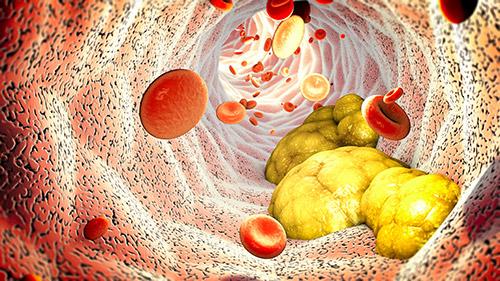The top 7 ways to optimise your cholesterol levels and improve your heart health
Medical review by
Dr Alasdair Scott MBBS FRCS PhDPublished
Key Article Takeaways
- Stop smoking
- Move more
- Eat well
- Sleep well
- Maintain a healthy weight
- Be alcohol aware
- Nurture your mental health
Heart disease is the biggest killer in the UK and your cholesterol profile is one of the main risk factors. Your lipid levels are also drivers of dementia and stroke. Making sure your lipids are “optimal” (and not just “normal”) is one of the best things you can do to look after your health and live better for longer.
The National Heart, Lung and Blood Institute in the USA1 recommends that you start checking your cholesterol early, from age 20 onwards, because the damage from cholesterol starts decades before you actually get symptoms from heart disease. It's not just a question of high vs. low lipids. You’re aiming for high HDL (“good”) cholesterol, low non-HDL (“bad”) cholesterol and low triglycerides. If you aren’t sure about what the different types of cholesterol do, you can read our cholesterol testing article.
Before we dive into the seven top ways to optimise your cholesterol, let's talk about what can cause problems with cholesterol in the first place.
Are any conditions associated with high cholesterol?
Type 2 diabetes2 and polycystic ovary syndrome (PCOS)3 are associated with high cholesterol. These are common hormonal conditions in the UK and worldwide. Having high or low levels of thyroid hormone and going through the menopause can also affect your cholesterol levels4.
High cholesterol and heart disease can run in families. If first-degree relatives like your parents have high cholesterol, you’re at higher risk. Familial hypercholesterolaemia (FH) is a condition where you get very high levels of LDL cholesterol from a young age. Levels increase as time goes on, raising your risk of having a premature heart attack or stroke.

What are risk factors for high cholesterol?
Table 1 shows the modifiable and non-modifiable risk factors for high cholesterol status. You can’t impact your non-modifiable risk factors - you’re born with your genes and you obviously can’t change what age you are. But modifiable risk factors are things that you can change to impact your cholesterol status.
| Modifiable risk-factors | Non-modifiable risk-factors |
| Smoking | Family history of high cholesterol (i.e. your genes) |
| Lack of exercise | Increasing age |
| Unhealthy diet | |
| Poor sleep | |
| Drinking excessive alcohol | |
| Psychological stress | |
| Being overweight |
How can I optimise my cholesterol?
When it comes to cholesterol, there’s a confusing amount of advice out there. We’ve gone through the evidence to give you the top 7 things you can do that will have the greatest effect on your cholesterol levels. And it’s not just about diet!
1. Stop smoking
Stopping smoking is the single biggest action you can take to improve your heart health. Smoking reduces your levels of “good” HDL cholesterol, meaning you won’t be mopping up the “bad’ non-HDL cholesterol from your blood vessels and organs. On top of this, smoking damages your blood vessels, making cholesterol more likely to get stuck inside them, causing atherosclerosis and narrowing.
2. Move more
Exercise is the most powerful “drug” to improve your cholesterol. Exercise increases your “good” HDL cholesterol and reduces your triglycerides and “bad” non-HDL cholesterol.
Essentially the more exercise you can do, the better, but even some is better than none. At a minimum you need to be getting about 150 minutes of moderate intensity exercise a week. This means raising your heart rate and breaking a sweat. If you’re doing vigorous activity (you won’t be able to talk while doing it) you can aim for 75 minutes per week. And don’t forget strength training. You need at least two resistance training sessions a week5.

3. Eat well
Diet is important but it’s not the only thing that affects cholesterol (or even the most important). Most of your cholesterol comes from your body's own cells, not what you eat. And actually, there’s no link between the cholesterol you eat and the cholesterol levels in your blood6. However, there are ways to improve your lipid profile through your diet.
Eat less saturated fat and more unsaturated fat
Saturated fats affect how your liver handles cholesterol and raise your “bad” non-HDL cholesterol levels. Foods with high saturated fat levels include red and processed meats, full-fat dairy products, fried foods, butter, coconut oil and palm oil.
Unsaturated fats are the healthiest type of fats. Lean oily fish and skinless chicken are low in saturated fats - oily fish can boost your “good” HDL cholesterol, too! It’s a good idea to swap butter (saturated) for unsaturated oils. Olive oil, high oleic sunflower oil and canola oil have monounsaturated fats which lower “bad” LDL cholesterol and raise “good” HDL cholesterol.
Cut down on refined carbohydrate (sugar)
Consuming food and drinks high in sugar raises triglycerides in your blood. It’s a good idea to have less sweet baked goods as they contain not only sugar but also butter, a saturated fat.
Eat more fibre
Some types of soluble fibre can lower “bad” LDL cholesterol in your blood, including fibre from oats and barley, broccoli, spinach, fruits and berries.
Eat more purple fruits and vegetables
Purple foods actually improve your cholesterol status because of their antioxidant compounds called anthocyanins. Anthocyanins have been shown to increase your HDL cholesterol and decrease your LDL cholesterol7. Try to fill your shopping basket with aubergines, blueberries, red cabbage, purple sprouting, blackberries. If you can, pick out a purple carrot!
Eat more nuts
Eating a handful of nuts a day is great for your heart. While they do have saturated fats, they also have monounsaturated fats which lower “bad” cholesterol and triglycerides. Nuts can also increase your “good” HDL cholesterol. Tree nuts like almonds, brazil nuts, cashews, hazelnuts and macadamia are the most beneficial.

4. Sleep well
It’s difficult to overstate how important sleep is for your metabolism. People that don't sleep between 7 and 9 hours a night have higher triglycerides and a higher risk of diabetes8.
If you’re sleeping for less than 7 hours a night, you’re more likely to develop cardiovascular disease9. If you’re sleeping over 9 hours a night, you’re more likely to have high “bad” non-HDL cholesterol and triglyceride levels8.
If you prioritise your sleep schedule, your heart will thank you. We’ve got some tips for how to sleep better in our Tiredness article.
5. Maintain a healthy weight
People can be a normal weight and have high cholesterol, but you're more likely to have low “good” HDL cholesterol and high “bad” non-HDL cholesterol if you're overweight.
The evidence has shown that even losing small amounts of weight can begin to increase your HDL cholesterol and decrease your non-HDL cholesterol10.
The National Institute for Health and Care Excellence recommends that you keep your waist measurement to less than half your height11. This and your Body Mass Index (your weight based on your height) can help you define where your healthy weight lies.
Maintaining a healthy weight is the key.

6. Be alcohol aware
When you drink alcohol, your liver breaks it down into triglycerides (fat molecules) and cholesterol, increasing the levels in your blood.
Aim to drink in moderation or as little as you can consistently manage to help your cardiovascular health. The NHS recommends that we drink no more than 14 alcohol units a week, spread over several days, or an average of under 2 units a day12. In contrast, Canada’s Guidance on Alcohol and Health recommends not to drink at all, or to have 2 standard drinks or less per week13.
That said, light drinking in community social settings can actually benefit your stress levels and risk of heart disease but, as with most things in life, it’s all about balance14.
7. Nurture your mental health
Psychological stress causes the release of cortisol and activation of your sympathetic nervous system which directly affects your metabolism and your lipid levels. This is a particular problem if the stress is long-term or “chronic”15. Studies have shown that psychological stress increases your levels of “bad” non-HDL cholesterol and triglycerides while lowering your HDL cholesterol16.

Try to manage your stress by setting boundaries and prioritising your wellbeing. We’re programmed to remember the negatives, so try starting a gratitude journal to push for a positive outlook on life. Spend more time outside in nature, which has been found to protect your mental health17.
Get tips on better health
Sign up to our emails on the better way to better health.
We'll keep you up-to-date with the latest research, expert articles and new ways to get more years of better health.


